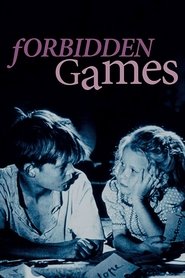Almost certainly the best performance by a five-year-old in cinema, Brigitte Fossey plays Paulette, an orphaned child who is somehow attempting to grieve yet is still too young to understand death. A sort of Grave of the Fireflies meets Bicycle Thieves, the realist quality of this film seems to also look forward to The 400 Blows, a film rightly regarded for its narrative orientation towards childhood. Yet it's more than just a tale of lost childhood innocence. France itself seems to be lightly sketched just below the surface: does the abandoned and crumbling mill not stand as a fitting metaphor for France fallen from its rural grace? Watched over by the "100-year-old" owl called the Mayor, the children fill this crumbling symbol of rural simplicity full of the graves of innocents. And it is only fitting that Paulette ends up at the Red Cross by the end.
That was actually my second viewing of Forbidden Games, so I possessed all the questionable advantages of that. Indeed, this meant that the ending was no longer a surprise to me, and a shade less of a tear-jerker. Still, nobody can reasonably expect the mother to suddenly appear, Hollywood-style, right at the end for une fin heureuse, and of course the audience understands why that can't happen after the film ends as well. This narrative-level decision is combined with the somewhat overhurried fade-to-black scene changes that characterise the film's editing, which has the effect of making that final ending fade utterly brutal — especially when your brain notices that Pauline's cries of «Michel!» homonymically transition to «Maman!».
One thing that struck me this time is how unstable the symbolism of the various animals is. We are first introduced to Pauline's small and innocent dog, but then we are quickly shown its opposite in the big horse who, in its singular madness, seems to possess some understanding and insight about the state of the world around it, a truth that eludes most of the men in their shallow and optimistic reading of the newspaper and received wisdom about the ongoing war. It then seems meaningful that it is another animal, a cow, that first leads Michel to Pauline, although what this might mean is left lyrically unarticulated. I could probably fill a page of text on the rest of the animals (even a hedgehog gets a mention), but they are integrated into the story without them being over-allegorised as clichéd archtypes or for the obvious "animals are innocent creatures" trope that would appeal to an urban audience. Either way, I suspect Forbidden Games might make a good double bill (or undergraduate essay) with Au Hasard Balthazar, assuming you could find a tissue manufacturer to sponsor the evening. As in, unless one reads all of Bresson's films as being "about God or Jesus", Balthazar the donkey seems to have a single, if almost opaque, meaning.
I very much liked this movie the first time I watched it, and have been looking forward to rewatching it for a while, yet I can't quite account for why I forgive its flaws. What is quite ineffective to me is the integration of the cartoonish view of country life with the story of the children. Having a somewhat contrasting thread is good in theory, but I could have done with a lot less of the Asterix-style buffoonery, even if some of it leads to some fun banter on behalf of the two lovers.
Anyway, it's remarkable that it was precisely this kind of French movie that Truffaut and friends were railing against when they were writing the manifesto for the French New Wave. This, as alluded to above, is especially strange given the similarities to, say, the pseudo-orphan in The 400 Blows. However, it seems that some of the (conservative) Truffaut's problem was chiefly located in the screenwriter's religious sacrilege.
Nevertheless, "It stings, but it's harmless," says Pauline at one point, which could be referring to the audiences' tears. As one of the characters notes, "You can't marry France," but you can marry this film. Bravo.
Synopsis: Orphaned after a Nazi air raid, Paulette, a young Parisian girl, runs into Michel, an older peasant boy, and the two quickly become close. Together, they try to make sense of the chaotic and crumbling world around them, attempting to cope with death as they create a burial ground for Paulette's deceased pet dog. Eventually, however, Paulette's stay with Michel's family is threatened by the harsh realities of wartime.

